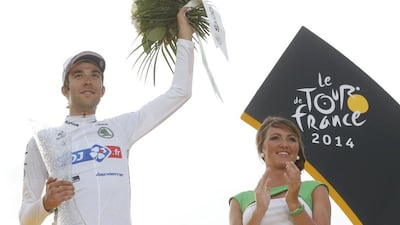When the 2014 Tour de France started in Britain with a British reigning champion riding for a British team, in some quarters there was the feeling that a piece of French heritage was being dragged across the channel.
To make things even worse, the British manager of the champion Team Sky, Dave Brailsford, had almost condescendingly said that his next challenge might be to try to win the Tour with a Frenchman.
The insinuation was that it had been easier to win the Tour with a rider from a country with almost no cycling culture than it would be to do so with a cyclist from the spiritual home of the sport.
For the previous two years Britain had been the epicentre of the Tour de France as Team Sky won the 2012 and 2013 editions with first Bradley Wiggins and then Chris Froome.
On top of that, the best sprinter over the last few years was another Briton, Mark Cavendish.
French viewers and commentators could only stand back in awe, too, at the reception the Tour got, first in Yorkshire where the first two stages took place, and then along the route from Cambridge to London.
German sprinter Marcel Kittel described the crowds as “amazing” while Spanish two-time Tour winner Alberto Contador said he had been “speechless” at the reception.
Garmin-Sharp’s American manager Jonathan Vaughters said he’d only ever seen hoards that big on Alpe d’Huez in the French Alps.
Some were asking whether Britain was launching some sort of Trojan Horse takeover of the Grand Boucle.
But already by the time the Tour left London to reconvene on the shores of its true home, the cracks in British domination were starting to show.
Cavendish had crashed out of the race on the first stage, leaving only three Brits in the race.
It took only two more stages for Froome to crash out and leave Italian Vincenzo Nibali to dominate the race.
Without Froome, Sky capitulated as Australian Richie Porte proved to be a poor substitute leader, finishing the race 23rd overall at more than an hour off Nibali – and actually being beaten by two of his domestiques (support riders).
By the end of the race, Welshman Geraint Thomas was the only Briton left, finishing 22nd overall and almost an hour behind Nibali.
In the meantime, the French were bristling.
Veteran Jean-Christophe Peraud proved his 37 years were no barrier to success, gradually improving as the race progressed to climb all the way up to a second placed finish.
Behind him, Thibaut Pinot secured third place, ensuring France had two riders on the podium for the first time since Laurent Fignon beat legend Bernard Hinault into second in 1984.
French AG2R won the team competition, helped in no small measure not only by Peraud but also 23-year-old Romain Bardet coming sixth and Blel Kadri winning the eighth stage from Tomblaine to Gerardmer.
In Pinot, 24, and Bardet, the future looks bright for French cycling. They finished first and second in the young riders’ white jersey category and both held their own with the best in both the mountains and time trial.
As well as those two, France has a whole host of talented young up-and-coming riders.
Sprinters Arnaud Demare, 22, and Nacer Bouhanni, 24, were French national road race champions in 2014 and 2012 respectively, with the latter also winning the sprinter’s jersey at May’s Giro d’Italia.
Tony Gallopin, 26, won the Tour’s 11th stage and wore the yellow jersey on Bastille Day. He’s a puncher who many believe could become an overall challenger.
But the most brilliant of the lot is perhaps climber Warren Barguil, who won the Tour de l’Avenir – the Tour de France for junior riders – in 2012 and claimed two stages on last year’s Vuelta a Espana.
The future of the Tour appears to be bleu, blanc, rouge, and not before time either.
As Brailsford said: “It’s good for everyone. It’s good for the French because it is after all the Tour de France. It’s good for all of French cycling and we’re happy for that.”
Follow us on Twitter @SprtNationalUAE

